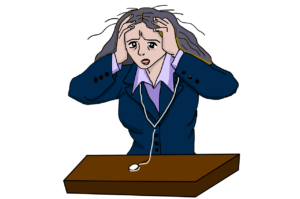Almost half of resident doctors reported burnout symptoms and 14 percent reported regret over their career choice in this new study
In a study of nearly 3,600 second-year residents who were followed-up with questionnaires since medical school, 45 percent reported burnout symptoms and 14 percent reported regret over their career choice.
Burnout is common among physicians and findings of this study should alarm healthcare professionals and policymakers. This new study was carried out to look at rates of burnout symptoms and career-choice regret, among physicians during residency and by clinical specialty.
 The study published in JAMA, involved 4732 US resident physicians who were enrolled between October 2010 and January 2011 in first year of medical school and completed the baseline questionnaire. Participants were invited to respond to 2 questionnaires; one during year 4 of medical school (January-March 2014) and the other during the second year of residency (spring of 2016). The last follow-up was on July 31, 2016.
The study published in JAMA, involved 4732 US resident physicians who were enrolled between October 2010 and January 2011 in first year of medical school and completed the baseline questionnaire. Participants were invited to respond to 2 questionnaires; one during year 4 of medical school (January-March 2014) and the other during the second year of residency (spring of 2016). The last follow-up was on July 31, 2016.
Burnout is common among physicians and findings of this study should alarm healthcare professionals and policymakers
Burnout is common among physicians and findings of this study should alarm healthcare professionals and policymakers
Clinical specialty, demographic characteristics, educational debt, Licensing Examination score, and reported levels of anxiety, empathy, and social support during medical school were analyzed in this study.
Symptoms of burnout was measured by 2 single-item measures (adapted from the Maslach Burnout Inventory). Career choice regret was defined as whether, if able to revisit career choice, the resident would choose to become a physician again.
Among 4696 resident physicians, 3588 (76.4%) completed the questionnaire during the second year of residency (median age 29 years in 2016) and 1822 (50.9%) were women. Symptoms of burnout were reported by 1615 of 3574 resident physicians (45.2%). Career choice regret was reported by 502 of 3571 resident physicians (14.1%). In a multivariable analysis, training in urology, neurology, emergency medicine, and general surgery were associated with higher relative risks of reported symptoms of burnout relative to training in internal medicine. Characteristics associated with higher risk of reported symptoms of burnout included female sex and higher reported levels of anxiety during medical school. A higher reported level of empathy during medical school was associated with a lower risk of reported symptoms of burnout during residency . Reported symptoms of burnout and clinical specialty were both significantly associated with career choice regret.
Researchers concluded that symptoms of burnout and career choice regret were prevalent among resident physicians, but varied substantially by clinical specialty, and further research is needed to better understand these differences and to address these issues.


